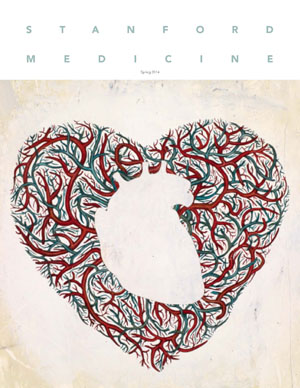February 24, 2014 - By Rosanne Spector

Jason Holley
In 2010, with a history of five heart attacks and a sudden cardiac arrest, Dick Cheney believed he was at the end of his life. In the new Stanford Medicine magazine, the former vice president talks about the heart transplant that has kept him among the living, and how to protect the health-care system that made his survival possible.
The Cheney interview is part of "Mysteries of the heart," a collection of articles on cardiovascular research and treatment in the spring issue of Stanford Medicine, produced with the support of the Stanford Cardiovascular Institute.
"A day doesn't go by that you don't think about the fact that you've been a beneficiary of a miracle that's a result, I always remember, of a donor. I wake up every morning with a smile on my face, grateful for another day that I never expected to see," Cheney said in the Q&A. (Audio of the Cheney interview is available in the online edition of the magazine.)
Also covered in this issue:
- Visionary computer designer Mike Nuttall's exploits as an ultramarathoner, despite having severe heart disease (online only).
- A man born with high cholesterol — a surprisingly common but hidden and deadly condition.
- Using stem cells to revolutionize cardiac care, and a family for which new treatments can't come soon enough.
- Untangling the effects of a heart surgery that saved a little girl, but then threatened her life.
- The new wave of heart- and fitness-monitoring devices, and why it's hard to integrate them into the medical system.
- An alternative to open-heart surgery to replace aortic valves.
- Catching up with a kid who in 1968 wrote to transplant pioneer Norman Shumway, MD, for advice — on his frog heart transplant.
The issue also includes articles on the use of big data in medicine, which will be the focus of the Big Data in Biomedicine conference May 21-23 at Stanford.
The magazine is available online at http://stanmed.stanford.edu. Print copies are being sent to subscribers. Others can request a copy at (650) 723-6911 or by sending an email to medmag@stanford.edu.
About Stanford Medicine
Stanford Medicine is an integrated academic health system comprising the Stanford School of Medicine and adult and pediatric health care delivery systems. Together, they harness the full potential of biomedicine through collaborative research, education and clinical care for patients. For more information, please visit med.stanford.edu.